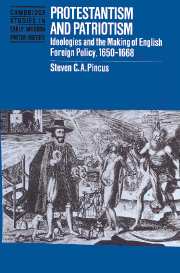Book contents
- Frontmatter
- Contents
- Acknowledgments
- List of abbreviations
- 1 Introduction
- Part I The rod of the Lord: ideology and the outbreak of the First Anglo-Dutch War
- Part II To unite against the common enemy: the 1654 Treaty of Westminster and the end of apocalyptic foreign policy
- Part III Popery, trade, and universal monarchy: ideology and the outbreak of the Second Anglo-Dutch War
- Part IV The Medway, Breda, and the Triple Alliance: the collapse of Anglican Royalist Foreign Policy
- 17 Historiographical overview
- 18 The circulation of news and the course of the war
- 19 The popular understanding of the war
- 20 The government's war aims
- 21 An Orangist revolution
- 22 Victory denied and wartime consensus shattered
- 23 The rise of political opposition
- 24 The road to Chatham: the decision not to send out a battle fleet
- 25 The demise of Anglican Royalist foreign policy
- Conclusion
- Bibliography
- Index
- Titles in the series
25 - The demise of Anglican Royalist foreign policy
Published online by Cambridge University Press: 01 October 2009
- Frontmatter
- Contents
- Acknowledgments
- List of abbreviations
- 1 Introduction
- Part I The rod of the Lord: ideology and the outbreak of the First Anglo-Dutch War
- Part II To unite against the common enemy: the 1654 Treaty of Westminster and the end of apocalyptic foreign policy
- Part III Popery, trade, and universal monarchy: ideology and the outbreak of the Second Anglo-Dutch War
- Part IV The Medway, Breda, and the Triple Alliance: the collapse of Anglican Royalist Foreign Policy
- 17 Historiographical overview
- 18 The circulation of news and the course of the war
- 19 The popular understanding of the war
- 20 The government's war aims
- 21 An Orangist revolution
- 22 Victory denied and wartime consensus shattered
- 23 The rise of political opposition
- 24 The road to Chatham: the decision not to send out a battle fleet
- 25 The demise of Anglican Royalist foreign policy
- Conclusion
- Bibliography
- Index
- Titles in the series
Summary
What were the political consequences of the defeat at Chatham and the subsequent concessions made at Breda? How did the English react to their government's failure to defend them against the wrath of the Dutch navy? How did they account for their defeat?
Certainly the end of the war was initially greeted as “good news” throughout the country. In London the peace was announced “with trumpets and kettle drums, and the people shouting for joy,” and villages throughout the country the rumor, and eventually the proclamation, of peace prompted huge celebrations: bells were rung, guns went off, fireworks were exploded. “The bells have hardly lain still in all the country about ever since the news of peace,” reported one of Williamson's corespondents from Lyme. In Weymouth the peace “raised the dead to life”
This display of popular emotion largely reflected relief at the conclusion of a war which had proved devastating. The end of the war meant the possibility of economic revival. Throughout the country people expected the peace to reinvigorate sagging commerce. From Truro Hugh Acland reported that “many people” were convinced that “if the treaty take effect” they would “be in better condition for the future.” In Bridgewater “trade advances in hope of a successful treaty.” “If a peace follow,” predicted Sir Andrew Riccard the Presbyterian governor of the East India Company, “the East India Company purpose to renew their trade, to attend it with as much or more vigor than ever.”
- Type
- Chapter
- Information
- Protestantism and PatriotismIdeologies and the Making of English Foreign Policy, 1650–1668, pp. 407 - 440Publisher: Cambridge University PressPrint publication year: 1996



